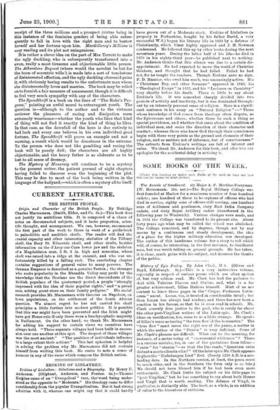History of Epic Poetry. By John Clark, U.A. (Oliver and
Boyd, Edinburgh. 5s.)—This is a very instructive volume, especially in respect of various poems which are often spoken of, but very seldom read. Mr. Clark has had the patience to deal with Valerius Flacons and Statius, and, what is a far greater achievement, Silius Italicus himself. Most of us are content to leave these pages in the "Corpus Poetarum Latin- ovum " uncut. Lucas, too, is treated in considerable detail ; but then Lucan has always had readers, and there has now been a reaction in his favour, eo that he is even read in schools. Mr. Clark scarcely does justice to the poet, who is surely far above the other post-Virgilian writers of the Latin epic. Mr. Clark's ideas on versification, too, seem to us a little strange. He speaks of Silius's verse as having " the true flow of the hexameter." The "true flow " must mean the right use of the pause, a matter in which the author of the " Punica " is very deficient. Some of Mr. Clark's phrases are difficult. What can be the meaning, for instance, of a metre being of "excremental whiteness " ? There is a curious mistake, too, in one of the quotations from Silius- "enim " for " etenim "—so that the line reads, "Quantum enim distant a morte silentia vitas ? " Of the later epics Mr. Clark appears to place the "Niebelungen Lied" first. (Surely 1250 A .D. is a mis- leading date. In the Northern version, at least, the poem must be much older, and in the Southern the form only is so late.) We should not have blamed him if he had been even more enthusiastic. Mr. Clark Elias his subject on his title-page to "post-Virgilian," but he has something to say about both Homer and Virgil that is worth reading. The defence of Virgil, in particular, is distinctly able. The book, as a whole, is an addition cf value to the literature of criticism.


































 Previous page
Previous page